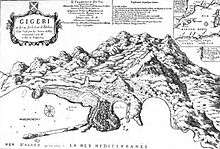Stanley Lane-Poole
Stanley Edward Lane-Poole (18 December 1854 – 29 December 1931) was a British orientalist and archaeologist.[1] Poole was from a famous orientalist family as his mother Sophia Lane Poole, brother Reginald Stuart Poole and uncle Edward William Lane were famous for their work in this field. His other uncle was Richard James Lane, a distinguished Victorian lithographer and engraver.

Biography
Born in London, England, from 1874 to 1892 he worked in the British Museum, and after that in Egypt researching on Egyptian archaeology. From 1897 to 1904 he had a chair as Professor of Arabic studies at Dublin University.
He was married to Charlotte Bell Wilson from 1879 until her death in 1905. The couple had three sons and a daughter; his eldest son predeceased him while of his other two sons, Richard was a Royal Navy officer and Charles was a forester who did much work in Australia.[2][3]
Bibliography
- Completed the First Book of the Arabic-English Lexicon, left unfinished by his uncle, E. W. Lane.
- Coins of the Urtuki Turkumans, International Numismata Orientalia, part 2 1875
- The Life of Edward William Lane (1877)
- The People of Turkey (editor) (1878)
- Lane's Selection From the Kuran (1879)
- Egypt (1881)
- Le Korân, sa poésie et ses lois (1882)
- Studies in a Mosque (Cairo, February 1883)
- Picturesque Palestine, Sinai and Egypt, D. Appleton: New York (1883)
- Social Life in Egypt: A Description of the Country & Its People (1884)
- The Life of the late General F.R. Chesney (editor) (1885)
- The Story of the Moors in Spain (1886)
- Turkey (1888)
- The Barbary Corsairs (1890)
- Sir Richard Church (1890)[4]
- The Speeches and Table-Talk of the Prophet Mohammad (1893)
- The Mohammedan Dynasties: Chronological and Genealogical Tables with Historical Introductions (1894)
- Lane-Poole, Stanley (1898). Saladin and the Fall of the Kingdom of Jerusalem. New York, London: G.P. Putnam's Sons.
- Babar, Rulers of India series (1899)
- History of Egypt in the Middle Ages (1901)
- Medieval India under Mohammedan Rule, AD 712-1764 (1903)
- Saladin and the Fall of the Kingdom of Jerusalem (1903)
- The Story of Cairo (1906)
- Lane-Poole, Stanley (1907). History of India: From Mohammedan Conquest to the Reign of Akbar the Great (Vol. 3). London, Grolier society.
- Life of Sir Harry Parkes with F.V. Dickins (1894)[5]
- "The Caliphate". The Quarterly Review. 224: 162–177. July 1915.
Edited
- Edward William Lane (1885). Stanley Lane-Poole (ed.). An Arabic-English lexicon: derived from the best and the most copious eastern sources. Williams and Norgate. p. 3064. Retrieved 2011-07-06.
- Edward William Lane (1863). Stanley Lane-Poole (ed.). An Arabic-English lexicon: derived from the best and the most copious eastern sources. Volume 1, Part 1 of An Arabic-English Lexicon. Williams and Norgate. p. 3064. Retrieved 2011-07-06.
- Edward William Lane, Stanley Lane-Poole (1865). An Arabic-English lexicon: derived from the best and the most copious eastern sources ... Williams and Norgate. Retrieved 2011-07-06.
- Edward William Lane, Stanley Lane-Poole (1863). An Arabic-English lexicon: derived from the best and the most copious eastern sources ... Volume 1 of An Arabic-English Lexicon: Derived from the Best and the Most Copious Eastern Sources. Williams and Norgate. Retrieved 2011-07-06.
- Edward William Lane (1893). Stanley Lane-Poole (ed.). An Arabic-English lexicon: derived from the best and the most copious eastern sources. Volume 1, Part 8 of An Arabic-English Lexicon. Williams and Norgate. p. 3064. Retrieved 2011-07-06.
- Edward William Lane (1877). Stanley Lane-Poole (ed.). An Arabic-English lexicon: derived from the best and the most copious eastern sources. Volume 1, Part 6 of An Arabic-English Lexicon. Williams and Norgate. p. 3064. Retrieved 2011-07-06.
- Edward William Lane (1865). Stanley Lane-Poole (ed.). Arabic-English lexicon, Volume 1, Part 2 (reprint ed.). Islamic Book Centre. p. 3064. Retrieved 2011-07-06.
- Edward William Lane (1872). Stanley Lane-Poole (ed.). Arabic-English lexicon, Volume 1, Part 4 (reprint ed.). Islamic Book Centre. p. 3064. Retrieved 2011-07-06.
References
- "Lane-Poole, Stanley". Who's Who: 1281. 1916.
- Simpson, R. S. "Poole, Stanley Edward Lane-". Oxford Dictionary of National Biography (online ed.). Oxford University Press. doi:10.1093/ref:odnb/35569. (Subscription or UK public library membership required.)
- Carron, L. T. (1983). "Lane-Poole, Charles Edward (1885–1970)". Australian Dictionary of Biography. 9, (MUP). Melbourne University Press. ISSN 1833-7538. Retrieved 14 August 2019 – via National Centre of Biography, Australian National University.
- Stanley Lane-Poole (1890). "Sir Richard Church". The English Historical Review, Volume V. Longmans, Green and Co., London. pp. 7–30 (Jan), 298–305 (April), 497–522 (July). Retrieved 2010-12-19.
- "Review of The Life of Sir Harry Parkes by Stanley Lane-Poole and F. V. Dickins". The Quarterly Review. 178: 460–485. April 1894.
External links
| Wikimedia Commons has media related to Stanley Lane-Poole. |
| Wikiquote has quotations related to: Stanley Lane-Poole |
| Wikisource has original works written by or about: Stanley Lane-Poole |
- Works by Stanley Lane-Poole at Project Gutenberg
- Works by or about Stanley Lane-Poole at Internet Archive
- Works by Stanley Lane-Poole at LibriVox (public domain audiobooks)
